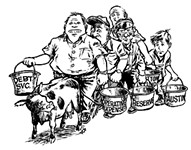Bonding Over the Bonds
Council's Dreams Come True
By Kayte VanScoy, Fri., May 8, 1998
|
|
Interestingly, it's not only the environmentalists who paved this council's way to power who want to deflect that outcome; now - following a year of the council's growing inner-city popularity and successes - the business community is suddenly ready to lend a helping hand in making this council's green dreams come true.
If you don't follow local politics, you may not realize that, in these parts, business and politics have not always mixed very well. (Actually that's a grave understatement, but this is my last "Council Watch" column, so I'm trying to be sweet.) Although everyone in Austin pretty much wants to be called an environmentalist just for having the good sense to live here, ever since the beginning of the fight over water quality this town has been a battleground between real estate developers and those who would rather swim than shop. When the Save Our Springs (S.O.S.) water quality ordinance passed a voter referendum in 1992, that battle reached its nasty nadir. The war that was waged over S.O.S. was classic us-and-them, and the results have, essentially, been a decade of deadlock over Austin's growth. But if this weekend's bond election is any indication, this council - and, in particular, this mayor - may have actually found a way to keep their most important campaign promise: breaking the stalemate between environmentalists and developers.
"Nobody has really enjoyed the continuing conflict between the time S.O.S. passed and today," says Glenn West, president of the Greater Austin Chamber of Commerce. S.O.S. Alliance Executive Director Brigid Shea agrees. "It's not healthy when environmental and business groups are at war," she says. Wow. Shea and West, who fought bitterly against one another during the S.O.S. referendum fight, are now uttering words that sound like a scaled-down script of the end to the Troubles in Ireland or the Mideast peace talks. They must have been as nervous as a high school couple out on their first date, but there they were Saturday night at Palmer Auditorium with a whole host of formerly opposed Austinites, whooping it up as the vote tallies for the bonds came in from precincts all over town.
"Oh yeah, we were opponents," admits Shea, adding that the new coalition represents a maturing in the Austin community as a whole. Shea says the ability to find common ground has its roots in the ICF Kaiser study released in February, which was commissioned by the Chamber to forecast Austin's economic future. The study confirmed the basic S.O.S. tenet that Austin's environment is important to Austin's economic health. "The Chamber finally had the ocular proof that it's in their economic self-interest to preserve the environment," says Shea.
West and Shea agree that another important factor was the personal politics involved. "It really began with Robin Rather and Gary Valdez," says West of S.O.S.'s brand-new president and the Chamber's brand-new chairman of the board (and brother of newly elected AISD V.P. Doyle Valdez). "Those people who hadn't really been a part of the long battle came at this with a fresh approach," West says. As Shea tells it, Rather contacted Chamber leaders and the two groups had an initially "hesitant" pow-wow at Güero's restaurant on South Congress in late February. The meeting lead to offers on both sides to help one another out, when possible. S.O.S. immediately had cause to call on the Chamber in March, when S.O.S. was fighting the construction of a new Motorola plant over the Edwards Aquifer. When the Chamber and City Council successfully intervened to have the plant moved, the S.O.S.-Chamber coalition was cemented and ready to move forward, together, to campaign for Saturday's bond package.
But time will tell if these two pugnacious siblings can really form a new way of thinking and doing business in Austin. For one thing, although central Austinites may be exhausted from the developer-environmentalist war, the suburbanites have just had their first taste of blood and are raring to fight. And if the council has a brilliant strategy to quell that fury, they certainly aren't divulging any details. "I think the longer people live here, the more people understand what we're trying to preserve," says the council's best-known environmentalist, Daryl Slusher. Griffith expressed essentially the same time-heals-all-wounds sentiment. For her part, Shea sees hope even in the opposition from Circle C, which voted approximately 75% against the bond package. "This was their best shot, and there was still 25% in favor of [the highly controversial] Prop. 2," says Shea. "That tells you that it's not at all this monolithic mean-spirited suburban enclave."
So, can time simply win over the suburbanites to the council and city core's vision of a compact, sustainable city? West doesn't think it's going to be quite that simple. "I'm more inclined to emphasize to the city of Austin that it needs to be more open and eager to work with more communities around Central Texas," West says. "The onus is on the city to find more ways to work with those groups." So far, the only sentiment being bandied about at the city is to organize more successfully against the suburbs in the next election, so the chamber may have a ways to go in selling that brand of regionalism.
"I'm not in favor of putting on a full court press to impress [the newly annexed areas] because we don't put on a full court press to impress anybody else in the community," says Councilmember Gus Garcia. "I think, you know, the best way to do it is not by what we say but what we do," he adds, pointing out that as the city brings its basic services to those areas, tempers might be quieted.
As for the future of this council's Smart Growth vision, we're likely to see more of it come September when another, bigger, round of bonds will land on the ballot. Griffith, Garcia, and Willie Lewis are already hard at work on a proposal for 16.3 miles of greenbelt along Walnut Creek in the northeast area of town. That ought to give S.O.S. and the Chamber plenty to bargain over, hopefully to the benefit of the rest of the city. Meanwhile, the council will be busy swallowing up more new areas of town and trying to begin spending up the debt authorized to them this weekend. Expect the debate over Prop. 1's Waller Creek/Convention Center package to fire up again as soon as talks about the Tax Increment Financing (TIF) district start. That ought to be a fun one. But maybe it will be the new S.O.S.-Chamber coalition which sails in to rescue the feuding council with new ways to join business and environmental interests downtown. Keep your fingers crossed.
Got something to say on the subject? Send a letter to the editor.









